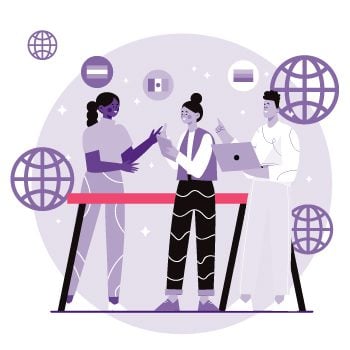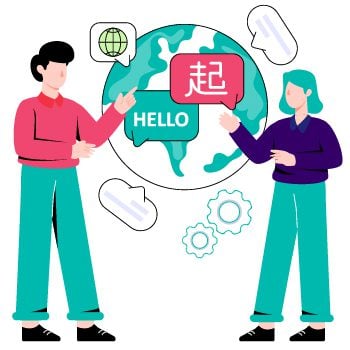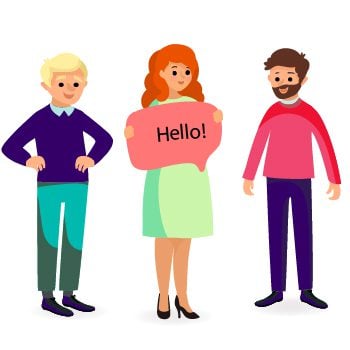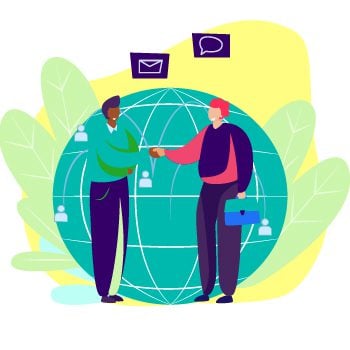
Are human Translations still reliable?
What are human translations?
Human translations convert written or spoken words from one language to another. They are completed by a professional translator fluent in both the source and target languages. Unlike machine translation, which relies on artificial intelligence to translate text, human translations are completed by a professional translator who can interpret the original meaning of the source text and convey it accurately in the target language. This is essential in ensuring a quality, accurate, and culturally appropriate translation for the target audience.
Human translation services can be sourced through a professional translation service or individual freelance translators. A human translation project aims to capture the original text’s true meaning and essence while maintaining its context, tone, and style in the target language. You must have a deep understanding of both languages and be a native speaker of the target language.
In addition to their language expertise, professional translators often utilize translation memory software to ensure consistency across translations and to save time on repetitive content. This tool stores translated text so that it can be reused in future projects, which can help maintain consistency across the range and speed up translation projects.
Overall, human translations are a valuable asset for businesses and individuals who need accurate and reliable translations for their projects. While machine translation can provide a quick solution for simple translations, human translation services offer higher quality and more nuanced translation experience for more complex projects that require an accurate representation of the original text.


The benefits of using human translations
There are some excellent benefits to using human translations over machine translations. First and foremost, a human translator can better understand and accurately convey the meaning of the source text. This is because they can consider the nuances of the language and culture that a machine might miss.
Another advantage of human translations is that the translator is a native speaker of the target language. This means that they have an innate understanding of the language and can produce a more natural-sounding translation easily understood by the audience.
Human translations can also provide a more contextual translation than a literal translation provided by a machine. A human translator can consider the intended audience and tone of the text, ensuring that the translation is appropriate and effective.
While neural machine translations have improved significantly over the years, they still have limitations when handling complex sentences or idiomatic expressions. On the other hand, a human translator can provide a more accurate translation of such phrases.
In short, human translations offer several benefits over machine translations, including a better understanding of the source text, natural-sounding translations, contextual translations, and accurate translations of complex sentences or idiomatic expressions. Read more about what are the different types of translations.
The challenges of human translations
While human translations offer a variety of benefits, they are not without their challenges. One of the most significant challenges is ensuring that the translator is proficient in the target language and fully understands the nuances of the source language. This is especially critical for translations that require a deep understanding of cultural context or specific industry jargon.
Another challenge with human translations is the potential for errors. Even the most skilled translators can make mistakes, mainly when working under tight deadlines or not entirely fluent in the source language. Sometimes, translators may not fully understand the source material and may inadvertently alter its meaning, leading to inaccuracies and misunderstandings. Human translations face challenges in accurately conveying sensitive content to the target reader while maintaining meaningful context, relying heavily on human intelligence to navigate linguistic nuances and cultural intricacies.
Language proficiency is also an issue when translating idioms, slang, and colloquialisms. These phrases are unique to a particular region or culture and may not translate accurately into other languages. Without a strong understanding of the source language, a translator may misinterpret or mistranslate these phrases, leading to confusion or even offense.
In some cases, the translator’s native language may also impact the quality of the translation. While a translator may be fluent in both the source and target languages, they may still struggle with conveying the intended tone or style of the original text, mainly when translating creative works such as poetry or literature.
Despite these challenges, many businesses and individuals rely on human translations for their accuracy and nuanced language understanding. However, it is crucial to be aware of these challenges and take steps to mitigate them by selecting skilled, knowledgeable translators and allowing ample time for the translation process. Additionally, alternative translation methods, such as machine translations and post-editing, can provide additional layers of accuracy and efficiency.
In the translation services industry, professional translation services provided by translation companies prioritize challenges associated with human translations. A reputable translation agency understands that linguistic accuracy, fluent translations, and the human touch in handling personal documents, medical documents, and other content from the source document ensure the correct format and cultural nuances are maintained. Unlike purely automated translation software, human translations offer localization services that go beyond literal conversion, addressing the complexities of the original language to deliver superior translation quality.


Are human translations still reliable?
Human translations have been around for centuries, providing a reliable way of translating documents, literature, and conversations from one language to another. However, with the rise of technology and artificial intelligence, some question whether human translations are reliable.
First, it’s essential to understand human translations. They involve a professional translator fluent in both the source and target languages, carefully translating the text or conversation from one language to another. The process can be time-consuming and requires great skill and knowledge, but the result is a high-quality, accurate translation.
There are several benefits of using human translations. Firstly, they offer a more personalized touch, taking into account cultural nuances and language variations that are difficult for machine translations to grasp. Human translations can also provide better quality control, as the translator can review the final document before sending it to the client.
However, there are also challenges when it comes to human translations. These include cost, time, and finding qualified and trustworthy translators fluent in both the source and target languages. Additionally, human translators may make errors in judgment or miss specific cultural nuances, which can lead to inaccurate translations.
So, are human translations still reliable in today’s technological world? The answer is yes but with some caveats. While machines and artificial intelligence have made great strides in the translation industry, human translators are still necessary for high-quality translations that require a personal touch and cultural understanding.
However, there have been examples of human translation errors with severe consequences. For instance, in 2007, a translation error on a birth certificate in Canada resulted in a woman’s deportation despite having lived there for 30 years. This highlights the need for qualified, professional human translators who take their work seriously and understand the consequences of even minor errors.
Alternatives to human translations exist, such as machine and hybrid translations that combine machine and human translation. These options can offer faster turnaround times and lower costs, but they may lack the same accuracy and personalization as human translations.
Examples of human translation errors and their impact
While human translations have been essential for centuries, they are not immune to errors. These errors can occur for various reasons, including the translator’s lack of understanding of the language’s context, poor knowledge of grammar and syntax, or cultural nuances.
While Google Translate and other neural machine translation tools have made strides in providing quick translations, the potential impact of cultural sensitivities is often overlooked, underscoring the need for professional linguists in technical translation. Examples of human translation errors highlight the limitations of solely relying on machine translators, emphasizing the importance of human intervention to ensure correct translation and mitigate the potential consequences of cultural nuances, which online tools or CAT tools may not adequately capture in this form of translation.
One of the most notorious examples of a human translation error is the sign in China that read, “translated out of the cabbages.” Instead of saying, “cabbage shredder,” the translation made little sense in Chinese. Another famous translation error is the phrase “Got milk?” that became “Are you lactating?” when translated into Spanish.
Apart from being amusing, translation errors can have more significant consequences. For instance, in 1980, a translation error on a plaque commemorating the Polish Katyn Massacre, a massacre of Polish military officers and intellectuals by Soviet Union agents in 1940, sparked an international crisis. The Russian version of the plaque omitted any reference to the Soviet Union and portrayed the massacre as being carried out by Nazis. The incident exposed the discrepancies between the two nations’ accounts of the tragedy and hindered reconciliation.
Similarly, translation errors can affect individuals or companies financially, damage their reputations, or even endanger their lives. Medical translations, for instance, need to be precise, as mistranslations can have disastrous results. 2013, a California Hospital was sued after a Spanish-speaking patient was given ten times the medication prescribed due to a translation error.
These examples illustrate how human translation errors can have dire consequences. Although human translators are professionals and can minimize errors with thorough proofreading and editing, they can still overlook mistakes. As such, individuals and companies should consider other translation methods or technologies, such as machine translation, to supplement their translations.
When choosing a human translator
While machine translations have advanced significantly in recent years, there are still certain situations where it is best to choose a human translator. Here are some examples:
- When translating legal documents or contracts, language can be complex and nuanced; even minor errors can have significant consequences. It is best to use a human translator with expertise in legal translation to ensure accuracy.
- When translating marketing or advertising materials: Effective marketing relies on translating words, cultural nuances, and idiomatic expressions. A human translator with marketing expertise can ensure your message resonates with the target audience.
- When translating medical or scientific documents: Accurate translation of medical and scientific terms is critical to ensuring patient safety and scientific integrity. Human translators with subject matter expertise can ensure that these documents are accurately translated.
- When translating creative writing: Poems, literature, and other forms of creative writing require accurate translation and the preservation of the original style and voice of the author. Human translators with experience in creative writing can ensure that these elements are maintained in the translated work.
While machine translations may be more convenient and cost-effective in some situations, it is crucial to choose a human translator when accuracy, precision, and nuance are essential.
Accurate and Reliable Document Translations
Translating between various language pairs allows for effective communication across a wide range of contexts and audiences. When dealing with official documents, such as legal contracts, birth certificates, and academic records, accurate translation is crucial to overcoming language barriers. Skilled translators ensure that the content of the original documents is preserved, making them comprehensible and legally valid for international audiences. This meticulous process not only facilitates cross-border communication but also helps in maintaining the integrity and intent of the original documents, thereby enabling smooth interactions and transactions in a globalized world.
Medical translation services provided by a professional translation company are essential for ensuring accurate and reliable translations of various types of documents, from patient records to medical research papers. A specialized translation team, consisting of experts with in-depth knowledge of medical terminology and practices, handles these sensitive translations. This expertise is crucial for maintaining the integrity and accuracy of the information, ensuring that it meets the high standards required in the medical field. By utilizing a professional translation agency, clients can be confident that their specialized translations will be precise, culturally appropriate, and compliant with all relevant regulations and standards.
Navigating Global Markets with Translation
In today’s global market, the translation process has evolved to accommodate a wide range of needs, from everyday document translations to complex localization services. Online translation services have made it easier than ever to access expert translators who can provide high-quality translations in various languages. These services often adhere to industry standards to ensure accuracy and consistency. Expert translators not only translate text but also adapt it to fit cultural contexts, a process known as localization, which is essential for businesses looking to resonate with local audiences. By leveraging online platforms and professional expertise, clients can efficiently navigate the translation process, meeting their diverse needs while maintaining high standards of quality.
Navigating international markets often requires adapting multilingual content to meet the needs of diverse target markets. Effective language translation services are crucial for ensuring that initial translations resonate with local audiences while maintaining accuracy and cultural relevance. However, managing translation costs can be a challenge, as the complexity of the content and the number of languages required can significantly impact overall expenses. By investing in high-quality translation services, businesses can effectively reach their target market, ensuring that their messaging is clear and compelling across different languages. Balancing cost with the need for precise and contextually appropriate translations is key to achieving success in global markets.
Certified Translators & Quality Standards
When dealing with technical manuals and other complex documents, engaging certified translators and expert linguists is essential for delivering high-quality services. Certified translators ensure that translations meet industry standards, providing accuracy and reliability in conveying intricate technical details. Expert linguists bring specialized knowledge of foreign languages and technical jargon, ensuring that all nuances are preserved in the translated content. By leveraging their expertise, language services providers can offer precise and contextually appropriate translations that enhance understanding and usability across different languages. This commitment to quality ensures that technical manuals are effectively communicated, meeting the needs of both international and domestic audiences.
For ensuring the accuracy and reliability of translated content, standard translations play a crucial role within a broad range of translation services. Certified translation is especially important when dealing with official documents and legal matters, as it provides a verified and trustworthy representation of the original text. Translation Management Systems (TMS) are integral to optimizing the translation process, streamlining workflows, and maintaining consistency across large projects. These systems help manage various translation solutions efficiently, from initial translation to final quality checks. By utilizing certified translations and robust TMS, clients can achieve high standards in their multilingual communications, ensuring that every aspect of their translation needs is addressed comprehensively and effectively.
Frequently Asked Questions
Are human translations more reliable than machine translations?
Human translations are generally considered more reliable than machine translations. Human translators can understand nuances, cultural context, and idiomatic expressions, resulting in more accurate and natural-sounding translations.
Can human translators accurately translate technical or specialized content?
Human translators are highly skilled and experienced in solving technical or specialized content. They possess subject matter expertise and can accurately convey complex terminology, ensuring the integrity and accuracy of the translated text.
How do human translators ensure accuracy in their translations?
Human translators employ their linguistic skills, cultural knowledge, and research capabilities to ensure accuracy in their translations. They deeply understand the source and target languages, conduct thorough proofreading and quality checks, and may consult subject matter experts when needed.
Are human translations better for preserving the intended meaning of the original text?
Human translators excel at keeping the intended purpose of the original text. They can capture the source language’s nuances, tone, and style, ensuring that the translated text accurately reflects the intended message.
Can human translators adapt translations to suit the target audience?
Absolutely! Human translators can adapt translations to suit the target audience’s cultural norms, preferences, and language conventions. They can ensure the translated text resonates with the intended readers, enhancing its effectiveness.


Sorry, the comment form is closed at this time.